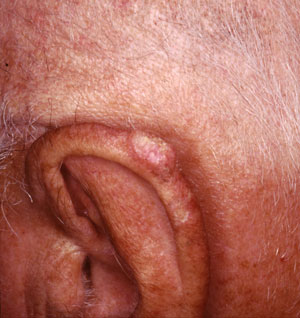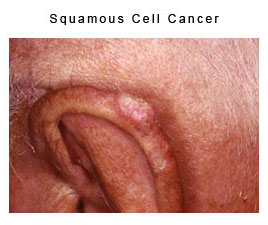Squamous Cell Cancer
Squamous Cell Cancer
Ralph A. Massey, MD — Santa Monica & Encino, CA

-
What is squamous cell cancer?
 A. Squamous cell carcinoma (SCC) is the second most common type of skin cancer. Squamous cell carcinoma is a tumor that arises in the outer layer of the skin (the epithelium). More than 250,000 new SCCs are diagnosed every year in the U.S. Persons with fair complexions and frequent sun exposure, are most likely to be affected. If treated in a timely manner, it is uncommon for squamous cell carcinoma of the skin to spread to other areas of the body.
A. Squamous cell carcinoma (SCC) is the second most common type of skin cancer. Squamous cell carcinoma is a tumor that arises in the outer layer of the skin (the epithelium). More than 250,000 new SCCs are diagnosed every year in the U.S. Persons with fair complexions and frequent sun exposure, are most likely to be affected. If treated in a timely manner, it is uncommon for squamous cell carcinoma of the skin to spread to other areas of the body.
-
How do you get squamous cell carcinoma?Ultraviolet light exposure (through the sun or tanning parlors) greatly increases the chance of developing skin cancer. Persons with light skin who sunburn easily are at highest risk, although anyone can get squamous cell carcinoma. With increasing age, the risk of developing skin cancer grows. Heavy sun exposure and severe sunburns as a child may especially increase the likelihood of skin cancer. Many less common skin conditions also predispose individuals to the development of SCCs and include conditions such as organ transplantation, chronic skin ulcers, prior x-ray treatment (e.g. as used for acne in the 1940-1960), arsenic ingestion, and toxic exposure to tars and oils.
-
What does squamous cell carcinoma look like?
A squamous cell carcinoma generally appears as a crusted or scaly area of the skin, with a red, inflamed base. Squamous cell carcinoma can present as a growing tumor, a non-healing ulcer, or just as a crust. Any worrisome skin lesions, especially those that are not healing, are growing, bleeding, or changing in appearance, should be evaluated by a dermatologist. A skin biopsy for microscopic examination is usually necessary to confirm the diagnosis.
-
Where does squamous cell carcinoma appear?Squamous cell carcinomas are common in sun-exposed areas like the face, neck, and arms. The scalp, backs of hands, and ears are especially common. However, SCC can occur anywhere on the body, even on the lips, inside the mouth, and on the genitalia.
-
How serious is squamous cell carcinoma?These skin cancers are locally destructive. If left untreated, squamous cell carcinoma can destroy much of the tissue surrounding the tumor and may result in the loss of a nose or ear. In certain cases, especially those on the lips and ears, or those that are left untreated, the tumor can spread to the lymph nodes and other organs, eventually resulting in death. Squamous cell carcinoma of the skin is responsible for approximately 2,500 deaths each year in the United States.
-
Can squamous cell carcinoma be prevented?A. In the vast majority of cases sqaumous cell cancer is caused by ultraviolet radiation from the sun. Proper sun protection may help to prevent the development of further skin cancers. Because 80% of lifetime sun exposure is acquired in childhood by age 20, careful sun protection in children may effectively prevent basal cell cancer later in life. Follow these simple steps:
- Avoid “peak” sunlight hours — 10 a.m. until 4 p.m. — when the sun’s rays are the strongest.
- Seek shade whenever possible. Remember “No shadow, seek the shade!” If your shadow is shorter than you are, the damaging rays of the sun are at their strongest and you’re likely to sunburn.
- Wear protective clothing, including a wide-brimmed hat, sunglasses and long-sleeved shirt and pants during prolonged periods of sun exposure.
- Apply a broad spectrum sunscreen with a Sun Protection Factor (SPF) 15 or higher, 15 – 30 minutes before going outdoors and reapply every two hours, especially when involved in outdoor activities such as gardening or swimming
Prevention and Treatment
Prevention is an important way to combat all skin cancers. To learn more about skin cancer prevention, visit our prevention page. To learn more about the treatment of squamous cell skin cancer, visit our skin cancer treatment page.Your Squamous Cell Cancer will be performed by Dr. Ralph A. Massey himself, within his certified outpatient surgery center in Santa Monica.
“so much expertise, caring and friendship”
Read full testimonial“Simply the best of the best”
Read full testimonial“Truly greateful for the high quality of care”
Read full testimonial“This doctor walks on water”
Read full testimonial“What an amazing healer!”
Read full testimonial